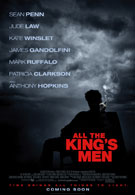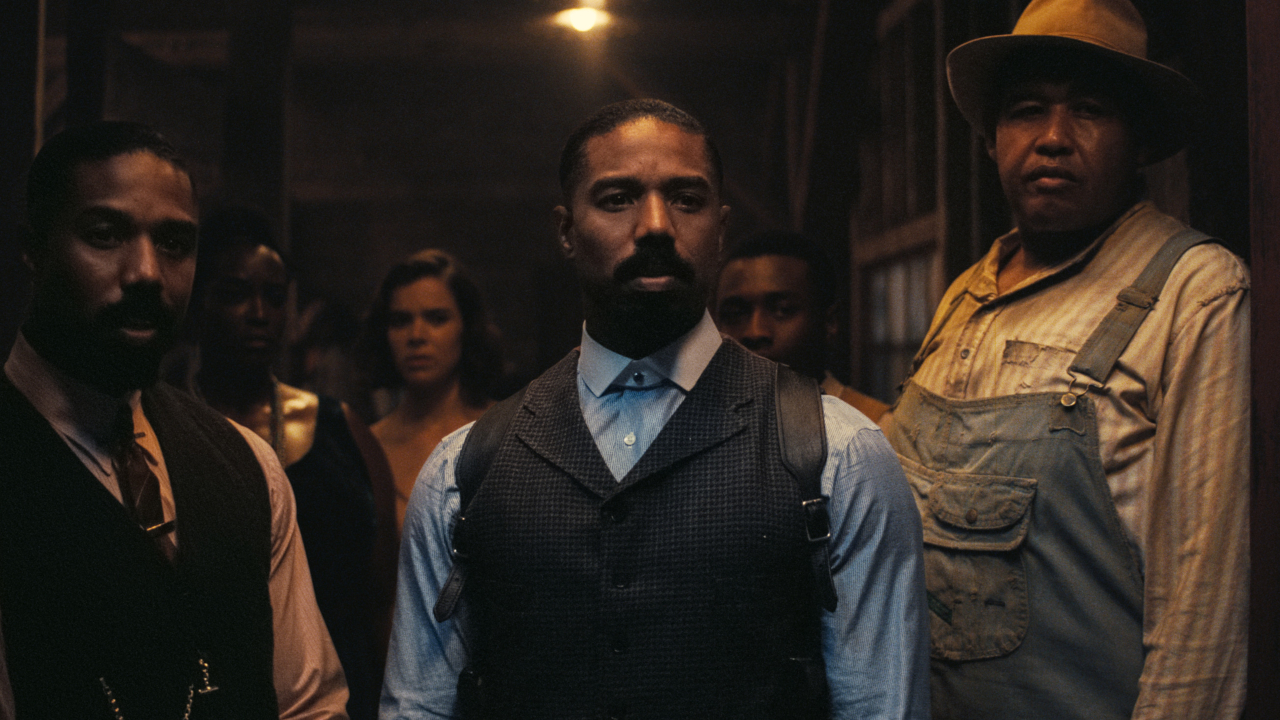All the King's Men packs in an incredible cast of Oscar winners, nominees, and wannabees in a complicated, dense exploration of corruption and the political process. Actually that probably doesn't cover it. Politics is at the center of it all, but writer/director Steven Zaillian delves into everything from family, to love, to growing up, to small town values in his story of men with seemingly good intentions warped by the darkness of the human soul.
It plays like an idealist's nightmare, but the film is actually an adaptation of the 1946 Pulitzer prizewinning Robert Penn Warren novel, which was in turn loosely based on the life of Governor Huey Long of Louisiana. Warren's book has actually been a movie before. Robert Rossen's 1949 version won Best Picture. The material's still good, but Zaillian's re-imagining is unlikely to win any Best Picture nominations, though don't be surprised of Sean Penn gets considered for another Oscar.
Penn deserves it for his performance as charismatic and conscientious rural politician turned Louisiana governor Willie Stark. Stark is a principled young city treasurer when reporter Jack Burden first meets him. He stands up to fight city corruption, only to be slapped down by an ignorant and unwilling to listen citizenry. Burden is taken with him, but it isn't until a twist of fate launches Stark towards stardom and eventually the governorship that he really pays attention. Soon Burden has hitched himself to Stark as the once staunchly moral man of the people gains power and begins using blackmail and scare tactics to push through policies that he thinks are for the public good.
Penn's Stark dominates the film, and when he's on screen it's impossible to take your eyes off of him. This may be the best performance of Sean's career, though ironically it's not Stark who is the film's focus. We see Stark's world through the lens of Burden's perception as he and everyone around him dance to the tune of corrupt lackeys and politicians for reasons that are never made entirely clear. How are we to reconcile Stark's supposed morality with his belief in original sin? "All the world is dirt", says Stark. To him good and bad are just something we make up as we go along. Where do the pieces of his personality fit together? Perhaps more importantly, why is Burden stuck to Stark and what happened to the scrupulously aboveboard crusader we met at the beginning of the film? All the King's Men never offers a satisfactory explanation to these questions. The best Stark can muster when Burden finally himself wonders what he's doing there is, "I'm the way I am, you the way you are." Sorry, I yam what I yam works for Popeye but in a film this full of manipulation and complication something more substantial is required.
It doesn't help that as good as Penn is, the actors around him just aren't up to snuff. Sean's character is full of nuance and layers, Jude Law's performance as Burden is as one-note as it gets. Faced with moral conflict after moral conflict the best Burden can muster is a stony stare and a shrug of his shoulders. Maybe he's simply overshadowed by Stark's passion, but with the film so centered around Jack Burden something with more heft is required. Law, who's usually a brilliant actor, doesn't find it. The film's supporting cast of top notch actors fares little better. Mark Ruffalo and Kate Winslet are nothing more macguffins while James Gandolfini plays yet another shady character one step away from a gangster. Anthony Hopkins is outstanding as an incorruptible judge, but his place in the story is little more than a footnote.
The most frustrating thing about All the King's Men is how good it could have been. It's chock full of interesting ideas, and even in its current form it's the kind of film that you'll think about long after it's finished. To help make sense of it all though, Sony should consider printing up 3x5 cards with a timeline on them to help audiences follow Zaillian's unexplained jumps through the years. It's never clear exactly when the movie's happening and as Stark's career advances it's hard to tell whether we've just experienced six months or twenty years.
Yet even as the tangled mess this movie is, it's worth seeing to try and understand exactly what Zaillian's script is trying to get across. Somewhere in there, he's saying something big and important. You can sense it, you can almost grab it, but the movie never makes itself accessible enough for us to hold on to it; whatever it is.












